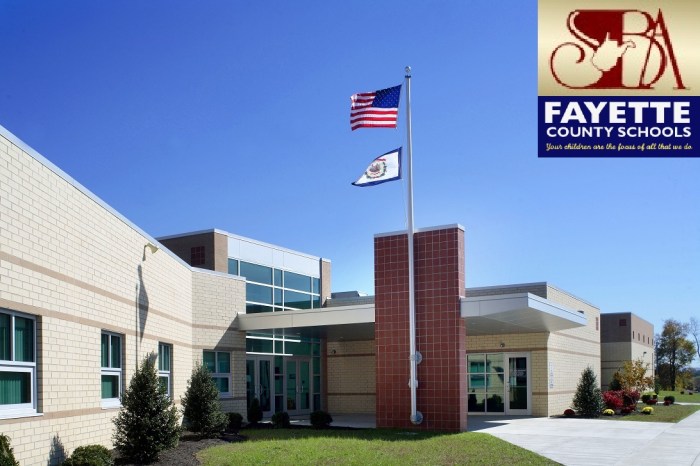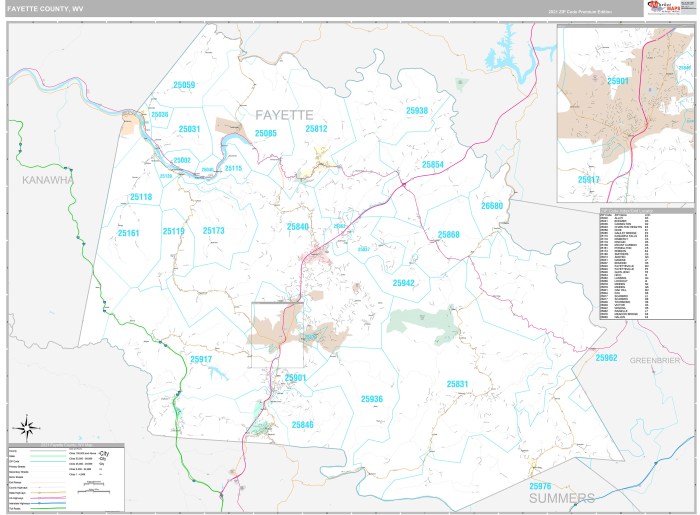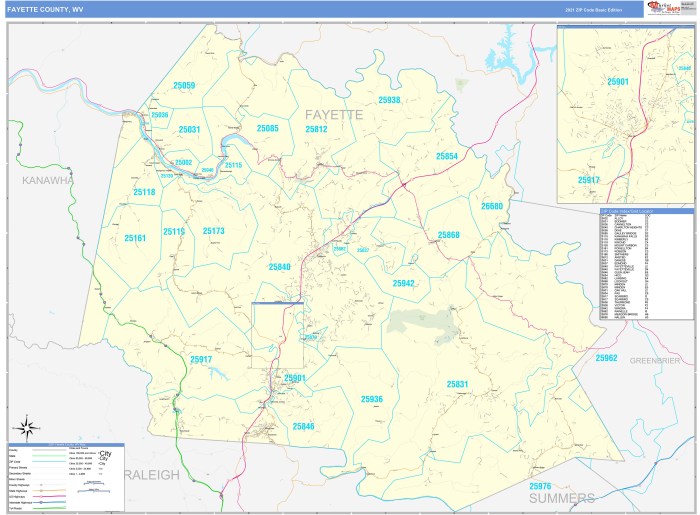Safe schools fayette county wv – Safe Schools in Fayette County, WV, is a comprehensive program dedicated to creating a safe and supportive learning environment for all students. With a focus on prevention, intervention, and response, the program addresses a wide range of safety concerns, from physical security to mental health and crisis management.
Through a collaborative effort involving students, staff, parents, and the community, Safe Schools in Fayette County, WV, strives to foster a positive school climate, enhance school security measures, and provide essential mental health services. By working together, we can ensure that all students feel safe, respected, and empowered to succeed.
School Safety Initiatives

The Safe Schools program in Fayette County, WV, is a comprehensive approach to creating and maintaining a safe and supportive learning environment for all students. The program has three main goals:
- To prevent violence and bullying in schools
- To create a positive school climate
- To provide support services for students who have been affected by violence or bullying
The Safe Schools program is implemented in schools through a variety of measures, including:
School safety assessments
Schools are required to conduct annual safety assessments to identify potential risks and develop plans to address them.
School safety committees
Each school has a safety committee that includes administrators, teachers, parents, and students. The committee develops and implements the school’s safety plan.
School resource officers
Schools are staffed with school resource officers who are trained to provide security and support to students and staff.
School counseling services
Schools provide counseling services to students who have been affected by violence or bullying.The Safe Schools program has been successful in reducing violence and bullying in Fayette County schools. In the 2017-2018 school year, there were no reported incidents of violence or bullying in any Fayette County school.
School Climate and Culture

Fayette County schools strive to foster a positive and supportive school climate and culture. Students feel safe, respected, and connected to their schools, and staff members are committed to creating a welcoming and inclusive environment. However, there are always areas where improvements can be made.
Role of Students, Staff, and Parents
All stakeholders play a vital role in creating a positive school climate. Students can contribute by being respectful of themselves and others, participating in school activities, and reporting any concerns to trusted adults. Staff members can create a positive environment by being supportive and encouraging, and by setting clear expectations for behavior.
Parents can support their children’s education by being involved in their schoolwork, attending school events, and volunteering their time.
School Security Measures: Safe Schools Fayette County Wv

Fayette County schools prioritize student safety by implementing a comprehensive suite of security measures. These measures aim to prevent and mitigate threats, fostering a secure learning environment.
The district employs a multi-layered approach that includes physical security measures, surveillance systems, and emergency protocols.
Physical Security Measures
- Secure entrances: All schools have controlled access points with security cameras and door locks. Visitors must be identified and authorized before entering.
- Fencing and gates: School perimeters are secured with fencing and gates to prevent unauthorized access.
- Security cameras: Schools are equipped with high-resolution security cameras that monitor both indoor and outdoor areas.
Surveillance Systems
- Intrusion detection systems: These systems detect unauthorized entry or movement within the school building.
- Fire alarm systems: Schools have interconnected fire alarm systems that alert occupants and emergency responders in case of a fire.
Emergency Protocols
- Emergency response plans: Each school has a comprehensive emergency response plan that Artikels procedures for various emergencies, including active shooters, fires, and natural disasters.
- Lockdown drills: Regular lockdown drills are conducted to familiarize students and staff with emergency procedures.
- School resource officers: Schools have partnerships with local law enforcement agencies, and school resource officers are present to provide additional security and support.
These security measures have proven effective in preventing and responding to threats. The combination of physical barriers, surveillance systems, and emergency protocols has helped deter potential intruders and provide early warning of suspicious activity.
However, continuous evaluation and improvement are essential. The district regularly reviews its security measures and makes necessary adjustments based on emerging threats and best practices.
Potential areas for improvement include enhancing surveillance capabilities with advanced technology, such as facial recognition systems or gunshot detection sensors, and increasing the frequency of emergency drills to ensure preparedness.
Mental Health and Crisis Response

Fayette County schools prioritize the mental well-being of their students. They provide comprehensive mental health services to ensure students receive the support they need to succeed academically and socially. These services include individual and group counseling, crisis intervention, and referrals to outside mental health providers.
Crisis Response Plan
The school district has a comprehensive crisis response plan in place to address emergencies and ensure the safety of students and staff. The plan Artikels procedures for responding to various types of crises, including natural disasters, active shooter situations, and mental health emergencies.
The plan is regularly reviewed and updated to ensure it remains effective and relevant.
Early Identification and Intervention
Early identification and intervention are crucial in preventing school violence. The school district provides training to staff members on how to recognize signs of mental health distress in students. Staff members are encouraged to report any concerns they have about a student’s mental health to the school counselor or administrator.
The school district also has a partnership with a local mental health agency that provides early intervention services to students who are at risk for developing mental health problems.
Community Partnerships
Safe Schools Fayette County fosters a collaborative network of partnerships that bolster school safety initiatives. These partnerships bridge the gap between schools, law enforcement, community organizations, and parents, fostering a cohesive approach to creating a secure and nurturing learning environment.
Partnerships play a multifaceted role in promoting school safety. They:
School Resource Officers (SROs), Safe schools fayette county wv
- Provide a visible and proactive law enforcement presence on school campuses, deterring crime and promoting a sense of safety.
- Collaborate with school staff to develop and implement safety protocols and emergency response plans.
- Engage with students, building positive relationships and fostering trust.
Community Watch Programs
- Empower community members to report suspicious activity and support law enforcement efforts.
- Create a network of vigilant eyes and ears, extending the reach of school security beyond school grounds.
- Foster a sense of shared responsibility and community ownership in maintaining school safety.
Parent-Teacher Organizations (PTOs)
- Provide a platform for parents to engage with school staff and administrators, discussing safety concerns and collaborating on solutions.
- Support fundraising efforts for school safety initiatives, such as security upgrades and mental health programs.
- Promote open communication and trust between parents and school personnel.
Community Mental Health Services
- Offer counseling, support, and resources to students experiencing mental health challenges, addressing potential safety risks.
- Train school staff on recognizing and responding to signs of mental distress, creating a more supportive and inclusive environment.
- Collaborate on crisis response protocols to ensure a coordinated and effective response to mental health emergencies.
Data Analysis and Evaluation

The effectiveness of the Safe Schools program is continuously evaluated through a comprehensive data collection and analysis process. This process involves gathering data from various sources, including student surveys, staff feedback, incident reports, and law enforcement records.
Key metrics are used to measure progress and assess the impact of the program. These metrics include:
- Number of reported incidents
- Severity of incidents
- Student and staff perceptions of safety
- Absenteeism and dropout rates
Data collection and analysis in school safety presents several challenges and limitations. One challenge is the difficulty in obtaining accurate and reliable data, as incidents may be underreported or unreported due to fear or stigma.
Additionally, the interpretation of data can be complex and influenced by factors such as the school’s demographics, socioeconomic status, and local context. Despite these challenges, data analysis remains a crucial component of the Safe Schools program, providing valuable insights for program improvement and resource allocation.
Best Practices and Innovations

Fayette County and other school districts have implemented effective practices and explored innovative approaches to enhance school safety. These initiatives demonstrate the commitment to creating a secure and supportive learning environment for students and staff.
One notable best practice is the establishment of a comprehensive school safety plan. This plan Artikels protocols for various emergency situations, including active shooter events, natural disasters, and medical emergencies. The plan is regularly reviewed and updated to ensure its effectiveness.
Innovative Approaches
Fayette County is exploring innovative approaches to school safety, such as implementing threat assessment protocols. These protocols involve identifying and assessing potential threats to school safety, enabling schools to take proactive measures to mitigate risks.
Another innovative approach is the use of technology to enhance security. Schools are installing surveillance cameras, access control systems, and visitor management systems to monitor and restrict access to school buildings.
Collaboration and Knowledge Sharing
Collaboration and knowledge sharing are crucial for enhancing school safety. Fayette County actively participates in regional and national school safety organizations, sharing best practices and learning from other districts.
The district also collaborates with local law enforcement agencies and emergency responders to develop joint training programs and ensure coordinated responses to emergencies.
Query Resolution
What are the goals of the Safe Schools program in Fayette County, WV?
The Safe Schools program in Fayette County, WV, aims to create a safe and supportive learning environment for all students by preventing and responding to threats, fostering a positive school climate, and providing essential mental health services.
How are security measures implemented in Fayette County schools?
Fayette County schools implement a range of security measures, including secure entrances, surveillance cameras, and regular safety drills. School staff receive training on threat assessment and response procedures.
What mental health services are available to students in Fayette County schools?
Fayette County schools offer a range of mental health services, including counseling, support groups, and crisis intervention. School staff are trained to identify students who may be struggling with mental health issues and connect them with appropriate resources.